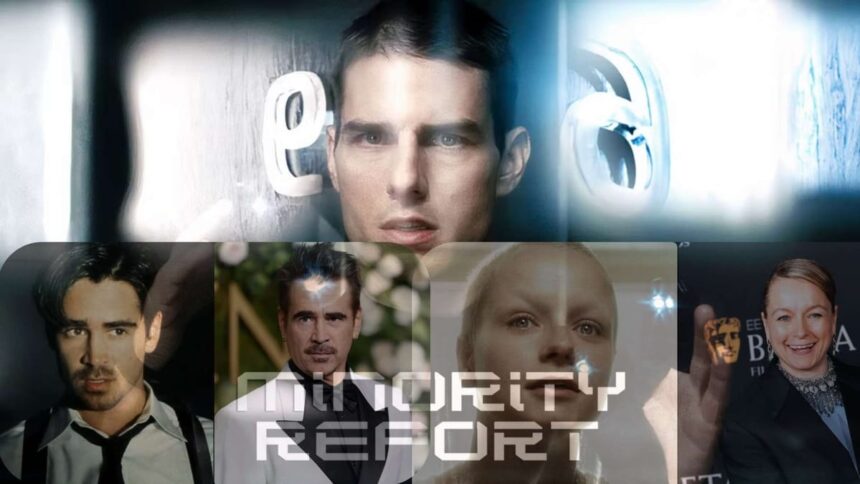Steven Spielberg’s Minority Report didn’t just blow minds in 2002—it basically wrote the blueprint for the tech we can’t live without today. Those gesture controls Tom Cruise was swiping around? That’s your phone. Those personalised ads shouting his character’s name? That’s your Instagram feed. How crazy is it that a movie about seeing the future actually saw our future?
Let’s track down the star-studded cast who brought this eerily accurate vision to life and see where they’ve landed 23 years later.
The Movie That Knew Too Much
Back in 2002, Spielberg gathered actual scientists and tech visionaries for a two-day “think tank” to imagine what 2054 might look like. Instead of waiting 50 years, most of their wild ideas showed up in our pockets within a decade!
The story follows Chief John Anderton (Tom Cruise), who runs a “Precrime” police unit that stops murders before they happen using three psychics floating in a pool. When the system identifies Anderton himself as a future killer, he goes on the run to prove his innocence.
The movie crushed it at the box office, making $358 million worldwide against a $102 million budget. Critics loved its smart blend of action and ideas. But its real legacy? The tech predictions that went from “no way!” to “everyday” faster than anyone expected.
Where Are They Now?
Tom Cruise (Chief John Anderton)
THEN: At 40, Cruise was already Hollywood royalty with a string of blockbusters behind him. Playing Anderton let him show both his action-hero muscles and his dramatic chops as a grieving father haunted by his son’s kidnapping.

NOW: At 63, Cruise remains one of the few true movie stars who can still open a film on name alone. The dude apparently doesn’t age—maybe he found some secret tech we don’t know about yet? He’s still crushing it with the Mission: Impossible franchise and surprised everyone when Top Gun: Maverick became his highest-grossing film ever in 2022. While other stars his age have retreated to streaming platforms, Cruise stays committed to the big screen experience, insisting his films deserve to be seen in theatres. I get it—who wants to watch those insane stunts on your phone?
Colin Farrell (Danny Witwer)
THEN: At 26, Farrell was the hot new thing in Hollywood—cocky, intense, and sporting some seriously slicked-back hair as Department of Justice agent Witwer.

NOW: At 49, Farrell has evolved into one of our most interesting actors. After a wild phase of partying and underwhelming blockbusters, he reinvented himself with complex roles in smaller films. His Penguin character from The Batman was so good it spawned its own HBO series in 2024, which won him a Golden Globe. Coming up in 2025, he’s starring with Margot Robbie in A Big Bold Beautiful Journey and will appear in The Batman Part II. He’s also got a new film with Edward Berger called The Ballad of a Small Player where he plays a high-stakes gambler. Far from the pretty boy of 2002, Farrell has transformed into one of film’s most respected character actors.
Samantha Morton (Agatha)
THEN: Just 25 when the film released, Morton delivered a haunting performance as Agatha, the most powerful “precog”. Despite spending most of her screen time submerged in water, her eyes told entire stories.

NOW: At 48, Morton has built an incredible career across both film and TV. She terrified audiences as Alpha in The Walking Dead and ruled as Catherine de Medici in The Serpent Queen. Twice nominated for Oscars (for Sweet and Lowdown and In America), she’s continued to choose challenging roles that showcase her extraordinary range. In 2009, she stepped behind the camera to direct The Unloved, drawing from her own difficult childhood in the British care system. She’s proof that the greatest talents often start in the supporting roles.
Max von Sydow (Director Lamar Burgess)
THEN: Already a living legend at 73, von Sydow brought gravitas and hidden menace to the role of Precrime’s director.

NOW: Von Sydow kept working into his late 80s, appearing in blockbusters like Star Wars: The Force Awakens and Game of Thrones before his passing in 2020 at age 90. His final decade proved his timeless appeal, working with directors from Martin Scorsese to J.J. Abrams. Few actors maintain that level of relevance across seven decades of filmmaking.
Neal McDonough (Fletcher)
THEN: At 36, McDonough was just establishing himself with his trademark intensity and those piercing blue eyes.

NOW: At 59, McDonough has become television’s go-to villain, creating memorable bad guys in shows like Arrow, Suits, and Yellowstone. His strict personal values—he refuses to do intimate scenes due to his faith—have occasionally limited roles, but his professionalism and distinctive presence keep him constantly in demand.
Tim Blake Nelson (Gideon)
THEN: Nelson brought quirky charm to Gideon, the warden of the “Hall of Containment”, where future murderers were stored.

NOW: At 61, Nelson has established himself as one of Hollywood’s most versatile character actors. He steals scenes in everything from superhero stories (Watchmen) to westerns (Old Henry). A Yale-educated playwright and director himself, Nelson balances mainstream success with thoughtful indie projects.
Lois Smith (Dr Iris Hineman)
THEN: At 72, veteran actress Smith made a memorable impression as the eccentric botanist who created Precrime but harboured doubts about its ethics.

NOW: Amazingly, at 95, Smith remains active in the industry. In 2020, she won a Tony Award for The Inheritance, becoming the oldest performer ever to win an acting Tony. Her career spans from 1955’s East of Eden with James Dean to today—that’s seven decades of excellence!
Peter Stormare (Dr Solomon Eddie)
THEN: The eccentric Swedish actor was 49 when he played the underground doctor who gives Anderton a brutal eye transplant.

NOW: At 72, Stormare keeps popping up everywhere. With over 250 acting credits, he’s brought his unique intensity to everything from playing Satan in Constantine to becoming a popular commercial spokesman. He’s also pursued music with his band, Blonde, from Fargo, and voice acting in video games.
Steve Harris (Jad)
THEN: Already known for The Practice, 36-year-old Harris brought steady support as a member of Anderton’s team.

NOW: At 59, Harris has maintained a consistent TV presence with notable roles in shows like Awake, Friday Night Lights, and The Practice. He’s the definition of a reliable character actor—never the biggest name, but always delivering quality performances.
Patrick Kilpatrick (Knott)
THEN: Veteran character actor Kilpatrick was 53 when he added “precrime officer” to his extensive resume of tough-guy roles.

NOW: At 76, Kilpatrick has expanded beyond acting into producing, directing, and writing, even publishing his memoir Dying for Living. Like many character actors, he’s built a lasting career by being dependable and versatile rather than famous.
The Technology That Came True
Man, this movie got SO MUCH right! Here’s what jumped from screen to reality:
- Gesture-controlled interfaces were pure sci-fi in 2002. Now we swipe, pinch and spread our fingers on screens every day. The film’s production designer says over 100 technology patents came directly from ideas in the movie!
- Personalised advertising that follows you around? In the film, digital billboards recognised Cruise and called out his name with targeted ads. Today’s online ads track your browsing history and seem to read your mind.
- Predictive policing algorithms are actually being used by police departments worldwide, raising the same ethical questions the film posed.
- Self-driving cars populate the film’s highways—now being tested in cities around the world.
- Voice-controlled smart homes are standard in the film—and increasingly in our reality with Alexa, Siri, and Google Assistant.
A Vision That Changed Our World
Twenty-three years later, Minority Report isn’t just entertainment—it’s practically a documentary. The crazy thing? Most of the tech wasn’t supposed to arrive until 2054, but we got there 30 years early!
The film’s central question hits even harder today: Is sacrificing privacy for security worth it? As facial recognition, predictive algorithms, and 24/7 surveillance become normal parts of life, Minority Report’s warnings feel increasingly urgent.
Next time your phone suggests a product you were just thinking about, or your smart speaker responds without being prompted, remember: Spielberg and Cruise tried to warn us. We just thought they were making a movie, not predicting tomorrow’s headlines.







